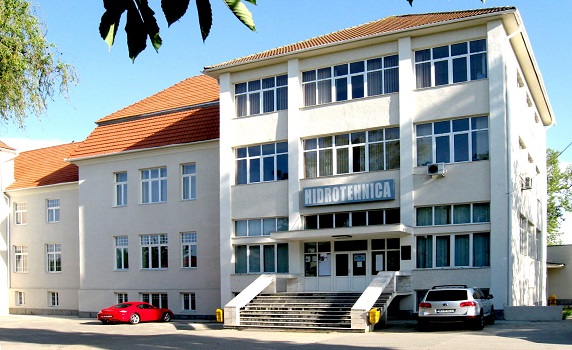 In 1948, the Hydrotechnical Constructions specialization was established within the Faculty of Civil
Engineering, while in 1952 the Department of Hydrotehnical Constructions was
setup within the same faculty. The Water Supply and Sewerage specialization was
established in the next year, when the Department got the "Regata"
building in which the hydrotechnical laboratory, the first of its kind in the
country, started to function in Timișoara. In 1979 another modern laboratory
hall, for hydrotechnical modeling, was opened. There are only two such modern
laboratories in Romania.
In 1948, the Hydrotechnical Constructions specialization was established within the Faculty of Civil
Engineering, while in 1952 the Department of Hydrotehnical Constructions was
setup within the same faculty. The Water Supply and Sewerage specialization was
established in the next year, when the Department got the "Regata"
building in which the hydrotechnical laboratory, the first of its kind in the
country, started to function in Timișoara. In 1979 another modern laboratory
hall, for hydrotechnical modeling, was opened. There are only two such modern
laboratories in Romania.
In 1990 the Department of Hydrotechnics get the title of "faculty" within the Technical University of Timisoara under the name of Faculty of Hydrotechnical Engineering, with three Departments: Water Development Land Reclamation and Improvement, Hydraulics and Environmental Engineering. In 2011 the Faculty of Hydrotechnical Engineering is integrated back into the Faculty of Civil Engineering, becoming one of the four actual departments of the faculty.
The teaching staff is composed by one professor, four associate professors, thirteen lecturers and seven assistant professors.

Areas of research
The areas of research within the HID Department are: water engineering, design and technical assistance in hydrotechnical structures, water constructional works, rivers regulation works; waterways and harbors; modern technologies in water engineering; drinking and industrial water supply network and plants; waste water treatment plants; sewage network; water biology and chemistry; water quality monitoring; numerical modeling in surface water and groundwater flow; numerical modeling of the pollutants transport in groundwater; land reclamation and improvement, irrigations and drainages; rural sustainable development; soil science studies and erosion controls; polluted soils rehabilitation; surveying, cadastre; waste disposal sites design and monitoring.
The department hosts the Research Centre in Hydrotehnical Engineering and Environmental
Protection. The center was set up in 2001 and certified by the Romanian Research Authority in Higher Education (CNCSIS certificate no. 99 / CC-C, 11 May 2001). The main research fields of the center lies generally on water engineering, having as subfields: Water constructional works, Urban and rural sanitation, Land reclamation and improvement arrangements. Based on the long experience of the researchers and the existing research infrastructure, the center is able to manage engineering projects in fields connected to water engineering.
The department includes the following laboratories:
- Laboratory of Hydraulics, with specialized stands for Fluid Mechanics, Applied Hydraulics;
- Laboratory of Water Supply Systems, which contains a pilot water treatment plant and a wastewater treatment pilot plant;
- Microbiology laboratory, which includes equipment for primary microbiological analysis with implications in microbiological analysis of water, soil and microbiological analysis of food.
- The department includes an experimental facility for study and research of vacuum sewage systems and a Mobile laboratory, equipped with analyzers for water, air and soil quality monitoring.
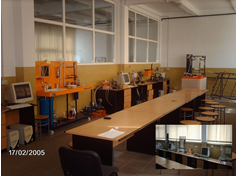
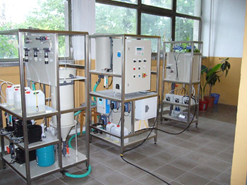
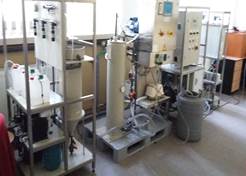

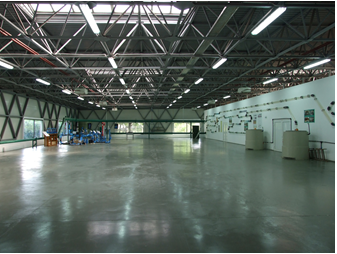

The Computer Network dedicated for teaching and research is composed by20 workstations with specific Software Applications: DUFLOW, HEC-RAC, EPANET 2.0, WaterCAD, SewerCAD, StormCAD, MODFLOW Visual MODFLOW, GRAITEC, Hydra Canalis, MIKE.
Relevant Projects
- Contract No.104/LLP-LDV TOI-2011-EN-002, 2011-1-RO1-LEO05-15329: Development of knowledge centers for life-long learning by involving of Specialists and decision makers in flood risk management Using advanced Hydroinformatic tools - LIFELONG LEARNING PROGRAMME, LEONARDO DA VINCI Transfer of innovation, "Politehnica" University of Timisoara 2011 - 3013,
- PN-II-PT-PCCA-2011-3.1-1129, 2012-2016 Hydrogen production with simultaneous wastewater treatment using a mixed anaerobic bacterial consortium selectively enriched
- PN II -PT-PCCA-2011-3.1-1129-BC, Partnership project coordonate by UPT, 2014-2015, Hydrogen production with simultaneous wastewater treatment, anaerobic mixed bacterial consortium selectively enriched (biosim)
- Study on the transport network capacity of sewerage system of areas with flooding risk in Timișoara City
- Study on developing the limits sanitary protection zones with severe regime and restriction, sizing hydrogeological protection perimeters for drinking water sources in Oradea City